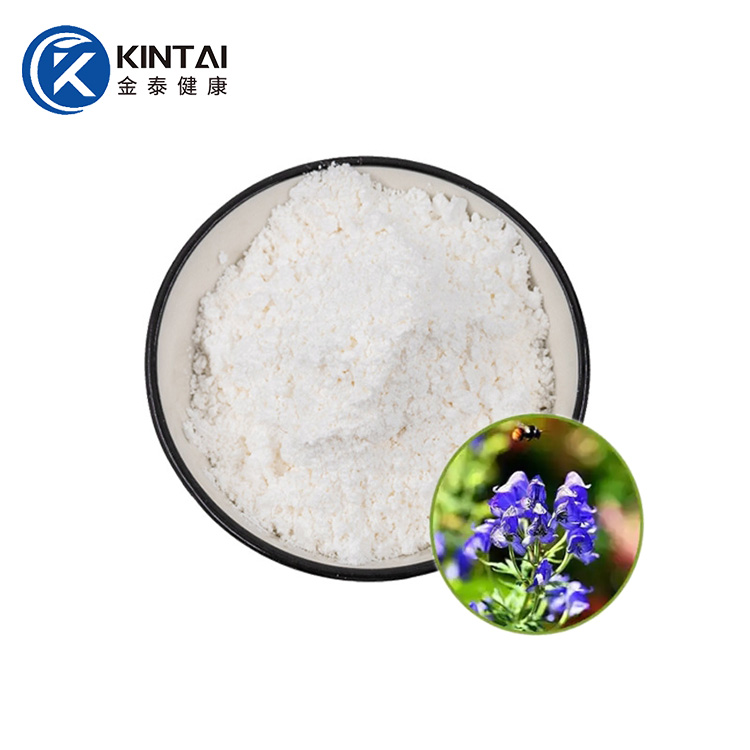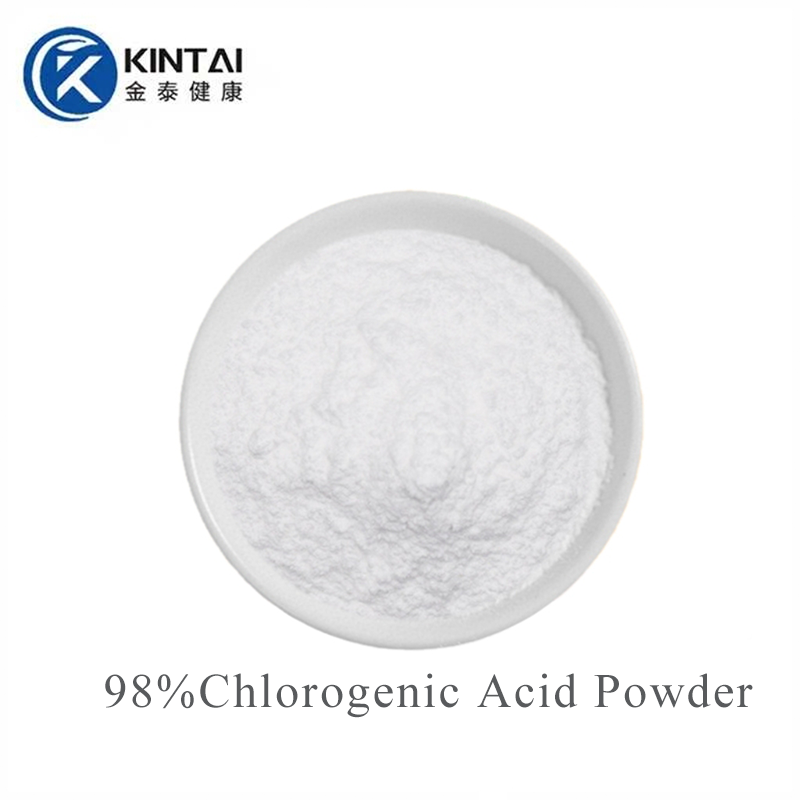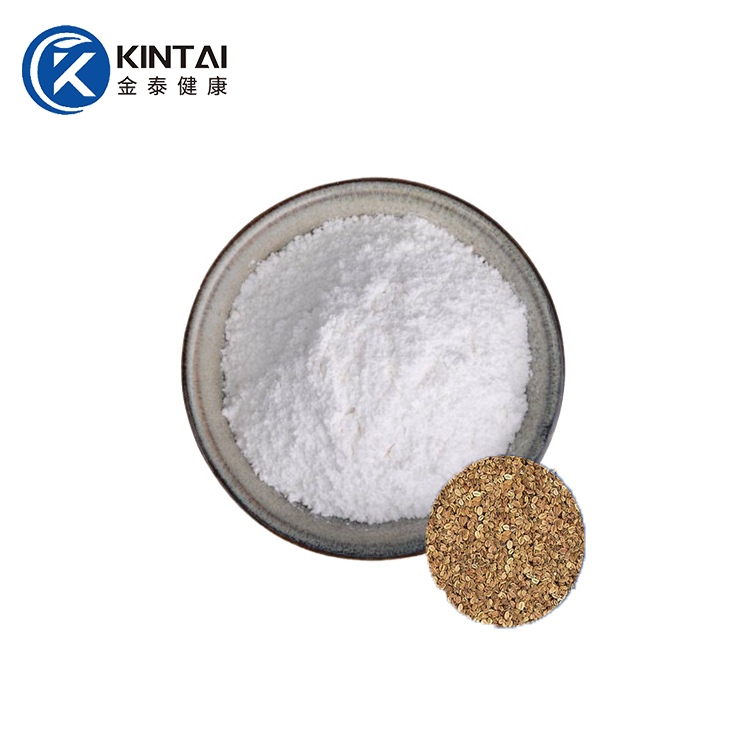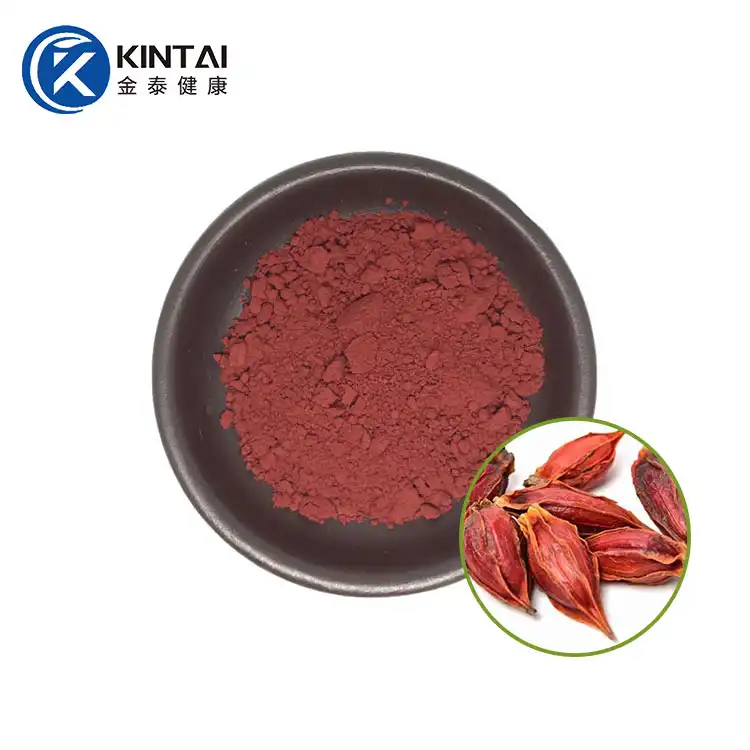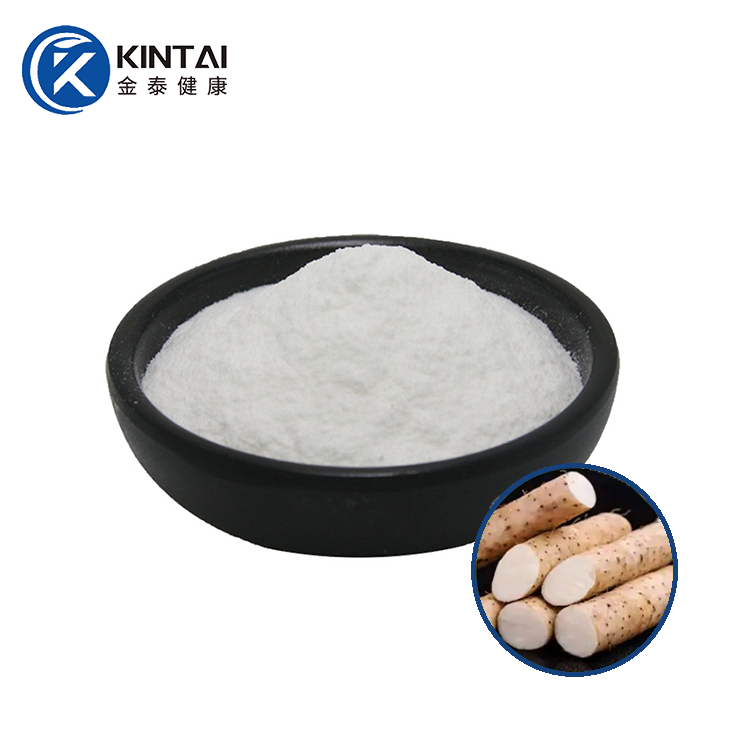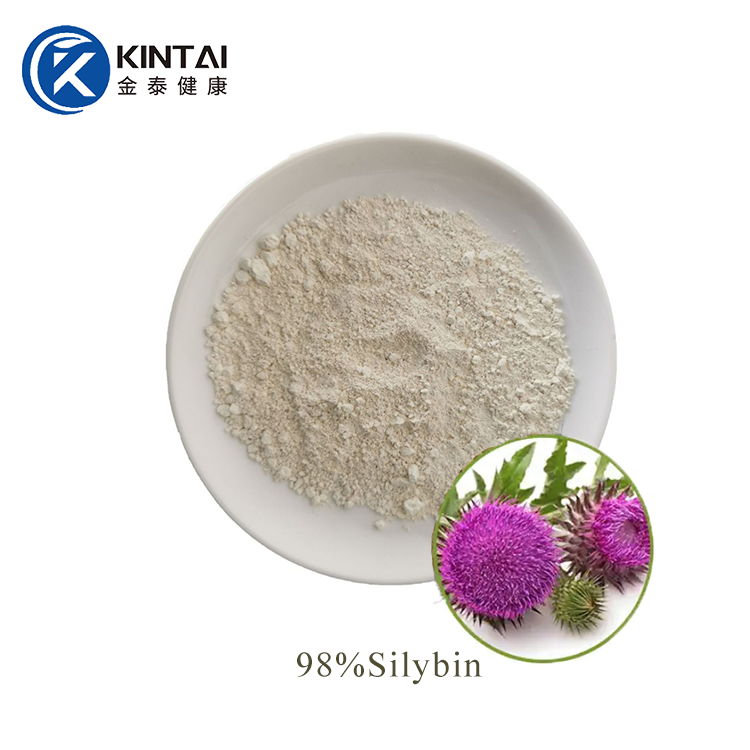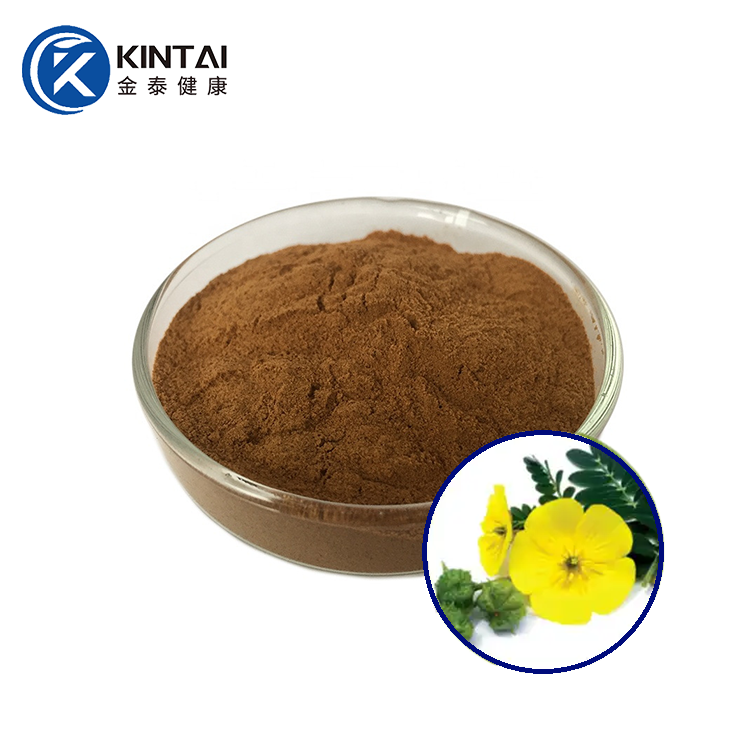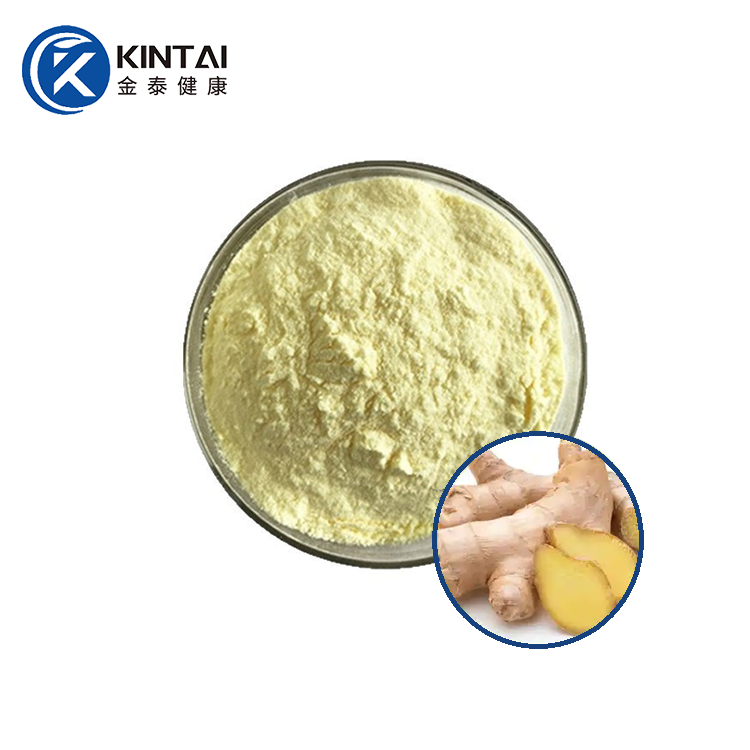Carnosic Acid Powder
Specification: 5%-95% Carnosic acid (Other specifications can be customized)
Test Method: HPLC
Extract Source:100% Natural
Origin:China
CAS Registry No: 3650-09-7
Application: Cosmetics, health products, food,etc.
Certifications: GMP, ISO9001:2015, ISO22000:2018, HACCP, KOSHER and HALAL
MOQ:1kg
Sample: Free sample available
Storage: Cool dry place and avoid light
Content: Natural, Non-GMO, Non-additive
Production Capacity: 2000KG/month
Delivery Time: Delivery within one day from the warehouse.
Payment: Multiple terms acceptable like T/T, L/C, DA
KINTAI's Advantage: 100,000 level clean production workshop, Non-additive, Non-GMO, Non-Irradiated/treat by heat only.
- Fast Delievery
- Quality Assurance
- 24/7 Customer Service
Product Introduction
Carnosic Acid Powder Manufacturer and Supplier
Carnosic Acid Powder is a diterpenoid compound isolated from the leaves of rosemary. It has significant antioxidant activity.
As a specialized producer of rosemary extracts, Kintai introduces its highly concentrated carnosic acid powder — a potent diterpenoid antioxidant. This ingredient effectively delays food oxidation, prolongs shelf life, and offers excellent thermal stability with recognized safety profiles.

Available in a wide range of concentrations from 5% to 98%, our carnosic acid ensures high purity and performance consistency, making it suitable for use in food antioxidants, functional skincare formulations, and even as a valuable intermediate in pharmaceutical applications due to its traditional medicinal properties.
COA of KINTAI Carnosic Acid Powder

KINTAI Carnosic Acid Powder Specification
|
Product name |
Carnosic acid |
|
Extract source |
Rosmarinus officinalis L. |
|
Extraction Solvent |
Ethyl alcohol |
|
Appearance |
White crystalline powder |
|
Solubility |
It can be dissolved in organic solvents such as ethanol, ethyl acetate, dichloromethane, etc. |
|
Identification |
HPLC |
|
Sulphated Ash |
NMT 0.5% |
|
Heavy metals |
NMT 20 PPM |
|
Loss On Drying |
NMT 5.0% |
|
Powder size |
80Mesh, NLT90% |
|
Assay |
Min. 95.0% |
|
Residual Solvents |
|
|
- Ethanol |
NMT 5000 PPM |
|
Microbiological Quality (Total viable aerobic count) |
|
|
- Bacteria, CFU/g, not more than |
NMT 103 |
|
- Moulds and yeasts, CFU/g, not more than |
NMT 102 |
|
- E.coli, Salmonella, S. aureus, CFU/g |
Absence |
|
Storage |
In a Tight, Light-resistant, and Dry Place. Avoid Direct Sunshine. |
|
Shelf life |
24 months |
Interested? We'd love to send you a free sample! CONTACT US>>>
KINTAI Carnosic Acid Production Process
- Solvent Configuration: The mixture of sodium citrate (which acts as a buffering agent to help control pH) and ethanol (the primary extraction solvent) is prepared first.
- Extraction Conditions: The specific time, temperature, and pH values are critical proprietary parameters that determine yield and efficiency.
- Acidification: Adding HCl (hydrochloric acid) protonates the carnosic acid, making it less water-soluble and facilitating its partition into the organic solvent (ethyl acetate) during the liquid-liquid extraction step.
- Purification Steps: The use of anhydrous acetic acid and apatite adsorption are specialized steps for further refining the extract and removing specific impurities.
- Final Product: The crystallization process is controlled to yield a standardized powder.

Chemical & Physical Properties
|
CAS Number |
3650-09-7 |
Density |
1.184±0.06 g/cm3 (Predicted) |
|
Molecular Formula |
C20H28O4 |
Molecular Weight |
332.43 |
|
Melting Point |
190 ℃ (lit.) |
Boiling Point |
506.4±50.0 ℃ (Predicted) |
|
Solubleness |
Soluble in chloroform (a little), methanol (a little) |
Test Method |
HPLC |

Carnosic Acid on Hair Growth
The core benefits of carnosic acid are based on its potent antioxidant and anti-inflammatory properties. It effectively scavenges free radicals within hair follicles, reducing oxidative damage and inflammation, thereby creating a more stable and healthy environment for hair growth. Studies have also shown that this ingredient can significantly inhibit the activity of 5α-reductase, thereby reducing the production of dihydrotestosterone (DHT)—the primary cause of androgenic alopecia. Through this mechanism, carnosic acid helps slow the progression of hair loss and enhance hair follicle vitality.Carnosic acid is good for hair growth.

Thus, adding carnosic acid to shampoo or serum not only strengthens hair roots and reduces hair loss, but also promotes blood circulation in the scalp and prolongs the hair growth cycle, achieving the dual goals of strengthening and preventing hair loss from the root.
Carnosic Acid Benefits
1. Highly Effective Natural Antioxidant
Delaying Food Oxidation: As a natural antioxidant, it effectively inhibits oil and food rancidity, extends shelf life, and replaces synthetic antioxidants (such as BHT/BHA).
Protecting Skin from Oxidative Damage: When added to skincare products, it fights free radicals and slows down skin aging.
2. Antibacterial and Anti-inflammatory
Inhibiting Pathogens: It has a significant inhibitory effect on common pathogens such as Staphylococcus aureus and Escherichia coli, making it a natural preservative.
Relieves Inflammatory Response: By regulating the expression of inflammatory factors, it improves inflammatory conditions such as skin allergies and gingivitis.
3. Neuroprotection and Cognitive Enhancement
Penetrating the Blood-Brain Barrier: It activates the antioxidant defense system of neurons (Nrf2 pathway), reducing oxidative stress damage to the brain.
Potentially Improves Memory: Studies have shown that it has a positive effect on neurodegenerative diseases such as Alzheimer's and Parkinson's.
4. Metabolic Regulation and Health Maintenance
Regulating Blood Sugar and Lipids: It helps improve blood lipid levels and insulin sensitivity, supporting cardiovascular health. Improves Digestion: Traditionally used to relieve indigestion and gastrointestinal discomfort.

Carnosic Acid Applications
1. Food Industry: Natural Antioxidant
Carnosic acid is an ideal natural antioxidant in the food industry, primarily used as a replacement for synthetic antioxidants such as BHT and BHA. It is also used in functional beverages and health foods to enhance their antioxidant properties.
2. Carnosic acid Supplement: Functional Health Ingredient
In the health supplement sector, carnosic acid powder is used to develop dietary supplements with antioxidant, anti-inflammatory, and neuroprotective properties. Common dosage forms include capsules, tablets, and powder supplements.

3. Cosmetics: Anti-aging and Protective Ingredient
Carnosic acid is a core active ingredient in cosmetics, added to anti-aging serums, creams, and sunscreens (at a concentration of 0.1%-1%). Its antibacterial and anti-inflammatory properties can soothe sensitive skin and replace some traditional preservatives, meeting the needs of the natural skincare market.
4. Pharmaceutical Ingredient: Potential Ingredient for Drug Development
In the pharmaceutical sector, carnosic acid is a high-value raw material used in the development of neuroprotective drugs, anti-inflammatory agents, and antibacterial drugs.
Why Choose KINTAI Carnosic Acid?
- Superior Quality: We utilize advanced purification processes to achieve carnosic acid purity ranging from 5% to 98%. Our products feature low impurities, high antioxidant activity, and robust batch consistency, all in strict compliance with international quality and safety standards.
- Flexible Customization: We offer customized solutions with varying purity, solvent carriers (oil-soluble/water-soluble), and dosage forms to precisely match your formulation needs in food, cosmetics, or pharmaceutical applications.
- Widely Versatile Applications: Our products are suitable for a variety of applications, including natural food preservatives, functional health supplements, anti-aging cosmetics, and pharmaceutical raw materials. A single raw material can meet your diverse development needs efficiently and reliably.
FAQ
Q1:What is the best source of carnosic acid powder?
A1:Carnosic acid, a phenolic diterpene specific to the Lamiaceae family, is highly abundant in rosemary (Rosmarinus officinalis).
Q2:What is another name for carnosic acid?
A2:Carnosic acid (Salvin), is a natural benzenediol abietane diterpene found in rosemary and common sage.
Q3:What does carnosic acid do for hair?
A3:It has been shown to exert protective effects on hair follicle cells, mitigate oxidative stress, inhibit the release of pro-inflammatory mediators.
KINTAI Certifications
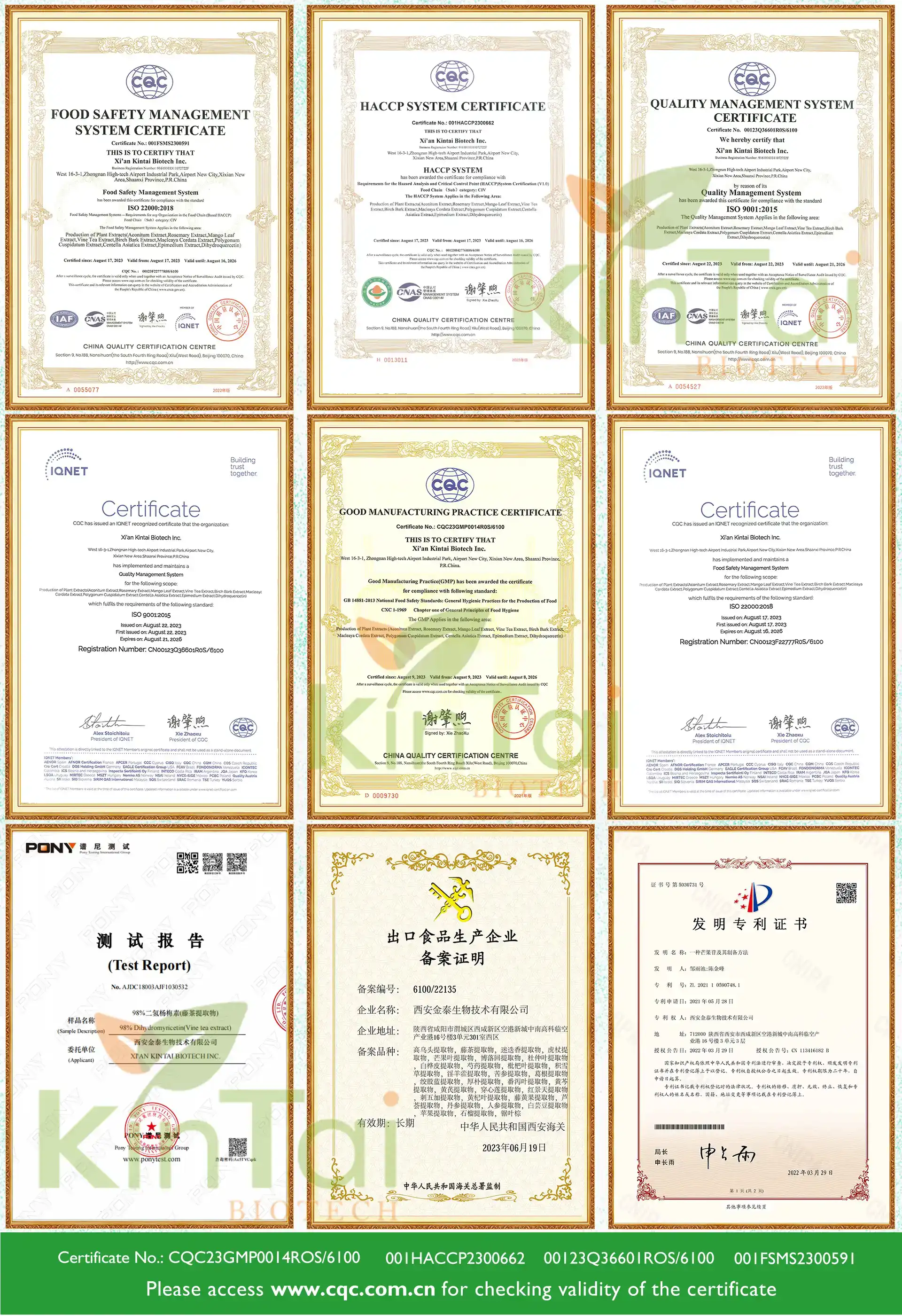
Send Inquiry

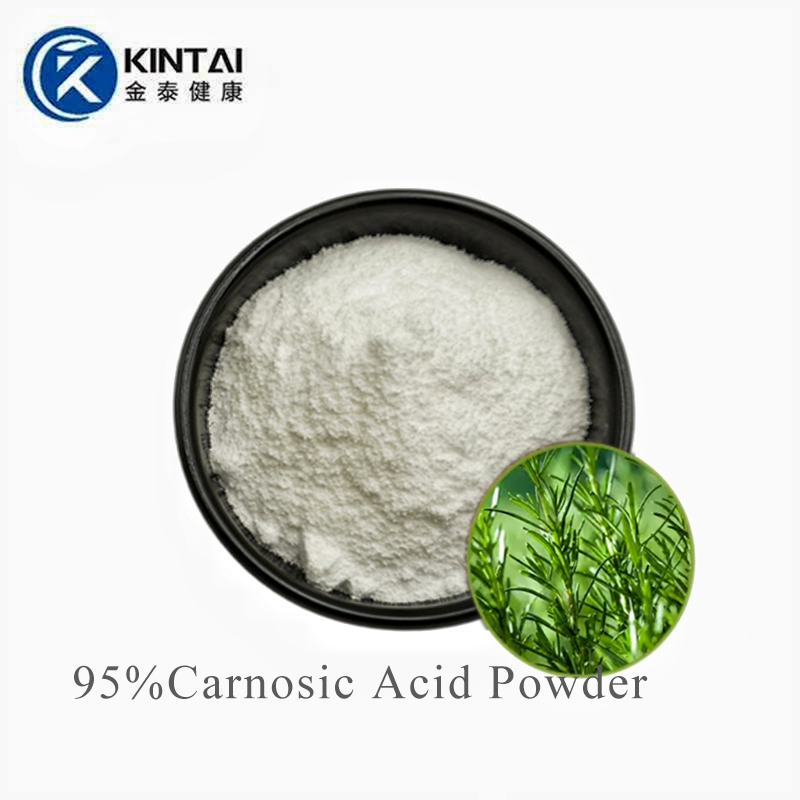
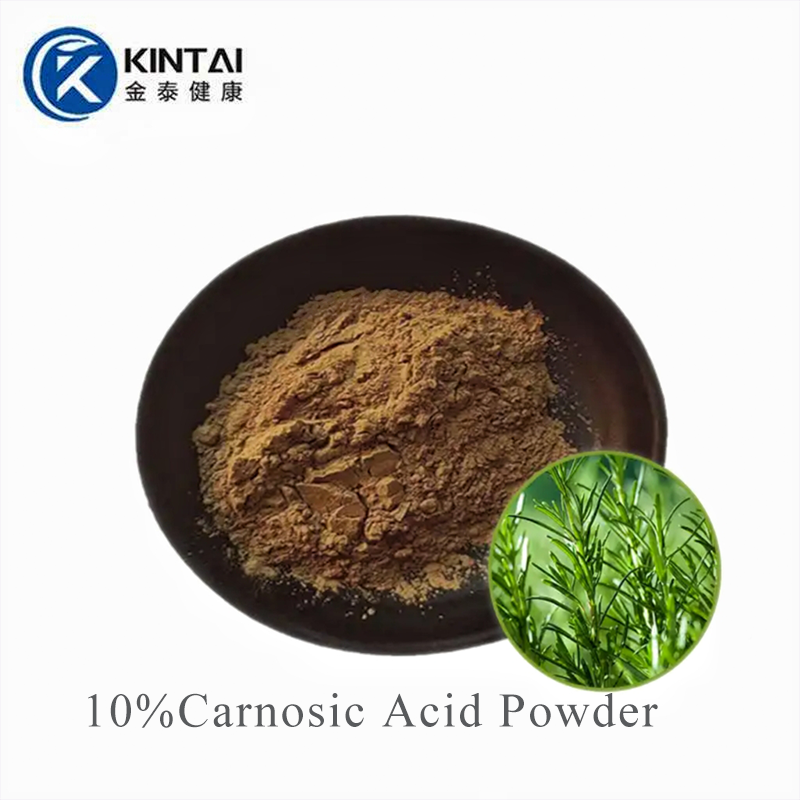
_1757919158890.jpg)
